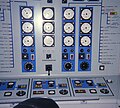 HDMS Niels Juel underway on 6 June 2005 | |
| History | |
|---|---|
| Name | Niels Juel |
| Namesake | Niels Juel |
| Builder | Aalborg Værft, Aalborg |
| Laid down | 20 October 1977 |
| Launched | 17 February 1978 |
| Commissioned | 26 August 1980 |
| Decommissioned | 18 August 2009 |
| Identification |
|
| Fate | Scrapped, 2013 |
| Badge |  |
| General characteristics | |
| Class & type | Niels Juel-class corvette |
| Displacement | 1,450 tonnes |
| Length | 84 m (275 ft 7 in) |
| Beam | 10.3 m (33 ft 10 in) |
| Draft | 4.8 m (15 ft 9 in) |
| Installed power |
|
| Propulsion |
|
| Speed | 30 knots (56 km/h; 35 mph) (with turbine) |
| Range |
|
| Endurance | 25 days |
| Complement |
|
| Armament |
|
HDMS Niels Juel (F354) was a Niels Juel-class corvette in the Royal Danish Navy which was in use until 1990. The ship was named after Niels Juel, a 17th-century Danish admiral.




